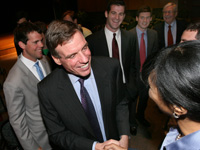Former Governor Warner Speaks to William & Mary Students About Values and Accountability in American Business and Politics
 WILLIAMSBURG, VA -- Former Governor Mark Warner brought laughter and contemplation to an attentive audience at William & Mary on March 12. Part of The Mason School MBA Ethics Speaker Series, he shared insights from his careers in business, non-profit and public sectors and challenged students to be a positive force in today's world of unprecedented change. His talk, on "Personal Values and Managerial Accountability," summarized his wide range of experiences. It also focused on the roles his commitment to reform and his love for America have played in his private and public successes.
WILLIAMSBURG, VA -- Former Governor Mark Warner brought laughter and contemplation to an attentive audience at William & Mary on March 12. Part of The Mason School MBA Ethics Speaker Series, he shared insights from his careers in business, non-profit and public sectors and challenged students to be a positive force in today's world of unprecedented change. His talk, on "Personal Values and Managerial Accountability," summarized his wide range of experiences. It also focused on the roles his commitment to reform and his love for America have played in his private and public successes.
Warner, primarily known for co-founding Nextel, a wireless communications provider, and later for a successful term as Virginia's Governor (2002-2005), is currently on the boards of the National Democratic Institute for International Affairs and the CNA Corporation, which provides research and analysis for public sector leaders. Also, he describes himself as a current "job applicant" for the U.S. Senate in 2008 on the Democratic ticket.
A Harvard Law School graduate, Warner used his early failed business attempts and a failed first plunge into politics as well as examples of his achievements to illustrate to his audience his views on perseverance and show how the son of middle-income America could make significant contributions to an emerging telecommunications industry and a nation. He spoke of the importance of bringing business principles into government and encouraged students to use their business backgrounds in the future to keep politics accountable and help the U.S. re-earn its position as a global economic leader. Feeling that public reform is not debated enough, he took the opportunity to state emphatically that transformative changes are vital in U.S. energy policy and research into oil alternatives, education, innovation and industry, healthcare, fiscal policies and in the nation's physical infrastructure.
To illustrate the effects of his commitment to reform, Warner recounted his experience as a Virginia Governor who inherited an unexpected and overwhelming financial deficit. Adamant that public policy makers not "sugar coat" problems for the public nor pass them along to the next administration, he felt obliged to face the challenge and rallied Virginians around a solution that resulted in fiscal soundness for the Commonwealth. He praised his constituents for their willingness during his tenure as Governor to endure necessary sacrifices such as higher taxes and a reduction in many conveniences. Toward the end of his term, Virginia went on to receive top score in the Government Performance Project's "Grading the States 2005" report, an analysis of how well each state is managed. Proud of the people of Virginia, Warner feels that all Americans have the capacity to remake the nation if asked to do so.
Passionate about bringing jobs to rural and small town America, Warner promotes outsourcing opportunities to these locations, as he's done in parts of Virginia, enabling individuals to "live where they grew up." He holds businesses accountable for more self-policing to support this endeavor and other issues relative to environment, labor and safety that affect our nation's strength and independence in an era where these appear to be diminishing.
In considering values and ethics in the public arena, he said, "A little bit of truth goes a long way in politics these days." His charge to those in attendance, and to others equally as fortunate to attend a top university like William and Mary, is to give back to their country by participating at some level in public policy. He asked that students face with integrity enormous present-day challenges and accept the equally enormous opportunities available to make an impact, whether through a business, non-profit or public career. Included in that charge was the directive to help America re-engage with the rest of the world and to find ways to unify politicians and business professionals here at home.
"With all its challenges," he said, "the U.S. still offers more opportunities than anywhere else. Take chances. This is a tipping point in U.S. history. We need to get it right . . . especially now."

